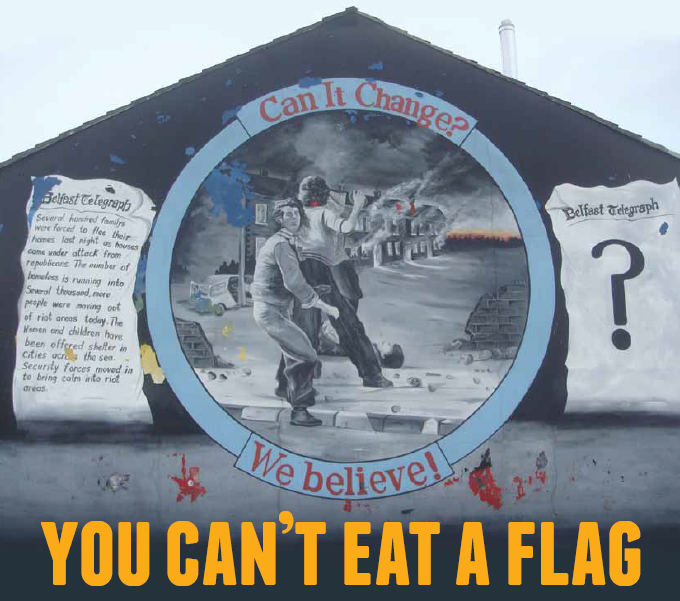Protestant working class communities in Northern Ireland are economically disadvantaged but can they find a politics to represent them, asks Paddy Wilson and Christopher Bailie.
God’s Chosen People, flag protestors, Van Morrison, the loyal sons of Ulster, James Hewitt, flute bands, Georgie Best, paramilitarism, Betty Sinclair, Linfield Football Club. These are just some of the faces and icons of Northern Ireland’s Protestant working class community.
But where does this community, once seemingly anchored on the certainties of British identity, jobs in industry and loyalty to a myriad of Protestant faiths, find itself in the modern Northern Ireland?
One answer is in a place of increased communal unease and perceived cultural threat. This manifested itself in the riots and political mobilisation that surrounded the December 2012 Belfast City Council decision to cease the continuous flying of the Union Flag from Belfast City Hall.
The move produced a visceral and violent reaction by some elements within the Protestant working class community. The result of this protest movement and unrest has been a media perception of the community, particularly in Belfast and its suburbs, as reactionary and increasingly right-wing.
However, this is far from the truth, according to William Ennis, a Progressive Unionist Party member from East Belfast, who told LookLeft that the flag protests must been seen in a wider context.
“The perception that the current state of politics in Protestant working class communities is right-wing or reactionary is due to the larger right-flank in Loyalism. A shared symbolism with the British right causes problems, in that loyalists are confused as to what Protestant working class values should be,” he said.
“Any society with an inflated reliance on symbolism will see flags as an outlet for dissatisfaction. Something that is hard to ignore is the emotional investment in loyalism.”
And despite the PUP’s involvement in directing an element of the flag protest movement, Ennis is clear that beyond this crisis of cultural identity lie much graver issues, in particular a lack of educational achievement and opportunity.
“There is no better way out of poverty than education. The days of heavy industry and a job in your dad’s factory are long over. There needs to be a new system that teaches usable skills for new industries.”
The issue of educational underachievement, particularly among young Protestant working class males has been a growing issue for Northern Irish society. Dawn Purvis, a former Member of the Northern Ireland Legislative Assembly (MLA) for East Belfast lays the blame with the current parties who represent her community.
“The DUP and Ulster Unionist Party are elected because they represent the political and constitutional desires of their constituents in maintaining the Union. However, in terms of social and economic justice, they do not effectively represent them. Protestant working class communities are structurally neglected. For example, the DUP and UUP uphold an educational system that disadvantages them.”
Purvis speaks with authority on educational disadvantage, having produced a report detailing the underachievement of Protestant working-class pupils. Her report found that 33.2% of pupils in Catholic non-grammar schools achieved 2 A-levels. The figure in Protestant secondary schools was 17%, a two-fold difference.
The roots of conflict remain in socio-economic disenfranchisement
She believes that the anger generated by the resultant lack of opportunity, combined with the ignorance of the issue among Unionist parties and their continued use of cultural and sectarian issues to shore up their vote, is a recipe for disaster.
“Disenfranchisement is large and growing. When I last stood for election, some ballot boxes in East Belfast only had a turnout of 29%. If you do not address the socio-economic disenfranchisement; that is where the roots of conflict remain and have the potential to flare up.”
However, Stormont remains completely oblivious to the damage being done to working class East Belfast. The Belfast Metropolitan College campus on Tower Street is threatened with closure, restricting the opportunities for youth development in the area. Although the main campus has been relocated from the City Centre to the Titanic Quarter, a £2.6 million funding cut has left limited teaching capacity.
However, the structural failings that have seen growing unemployment and precarious work within the Protestant community has not manifested itself in the growth of a political focus on socio-economic issues. According to Peter McGuire, a former Loyalist paramilitary and current member of the Workers’ Party, this is not however due to a lack of a progressive tradition within his community.
“There has always been a sizable radical, socialist, left of centre constituency within the Protestant working class communities in the north of Ireland,” he says.
“At its peak in the late 1950s and 1960s, the Northern Ireland Labour Party, supported mainly by working class Protestants in Belfast, was the only real opposition to the ruling Unionist Party, attracting almost 100,000 votes in the 1970 Westminster election. During the Troubles, Loyalist political parties campaigned for better housing, employment, and the expansion of the welfare state.”
This is a radical tradition McGuire traces back to a tradition which he believes has been largely “airbrushed out of history”.
He said: “It has existed since the days of the Hearts of Steel or Steel Boys, an exclusively working class Presbyterian movement formed in Templepatrick, County Antrim in 1770. They opposed English landlords, threatened rent collectors and forced farmers to sell their produce at prices the poorest could afford. We see it throughout Irish history with the United Irishmen, during the 1932 riots and again with the Outdoor Relief Workers strike and the Irish Railway Company strikes in the early 1930s.”
He added: “That tradition is still there, however attempts at achieving working class solidarity have always been shortlived. The constitutional issue has always remained the dominant political question and it has proved impossible to realign politics.
“Movements attempting to develop across the sectarian lines on traditional Labour issues of social conditions, wages, housing, employment etc. could always be divided, split and undermined regarding their position on the constitutional issue; loyalty, or not, to the state.”
With electoral turnout at rock bottom for working class Protestant areas, limited opportunity and increasing anger about cultural issues, the question of how to organise people to campaign on class issues, while avoiding sectarian ‘whataboutery’ concerns Courtney Robinson, a youth member of the Socialist Party from East Belfast.
“Youth are turned off by the political process in Stormont,” she said. “They see no alternative coming from there. Also, those out protesting at the height of the flag protest were expressing anger at what they perceived as an attack on the last thing that they had left, their identity.
“Communities have been stripped bare. The absence of an organised, avowedly left force in areas has allowed a more reactionary element to attempt to seep through and exploit the anger. But the actual concerns of the Protestant working class, outside of issues of flags and parading, are the same as any working class community around the world.”
She adds: “You have to be active and involved at grassroots, community level issues. Take for example the protests to keep Avoniel Primary School or the Tower St. Tech open. These are campaigns that were organized outside any formal party or trade union structure. They were started by community members, defending the interests of their community.”
This need to build a progressive politics from the ground up within the Protestant working class community is one with which McGuire agrees.
“A working class movement needs to be developed at a ground level, working, without fanfare, within communities helping to develop political consciousness. We need to help people gain an understanding of basic political theory and structures and how that relates to their own situation. We need to help people gain an understanding of the history, politics and identities of all the people living on the islands of Ireland and Britain.”
The issue still remains however, that the DUP/UUP may misrepresent the interests of the working class, but are still routinely voted in. As Purvis summarises: “There is an appetite for a movement based on social and economic concerns but it is decimated every time there is an issue around culture. That is by design. There are those on both sides of the sectarian divide that wish to maintain the conflict on a cultural level because that secures their electoral base.”
It’s this vicious circle, where any successful political mobilisation on bread and butter issues can be successfully undermined by the provoking of cultural controversies, that the progressive voices within the Protestant working class have yet to overcome.





